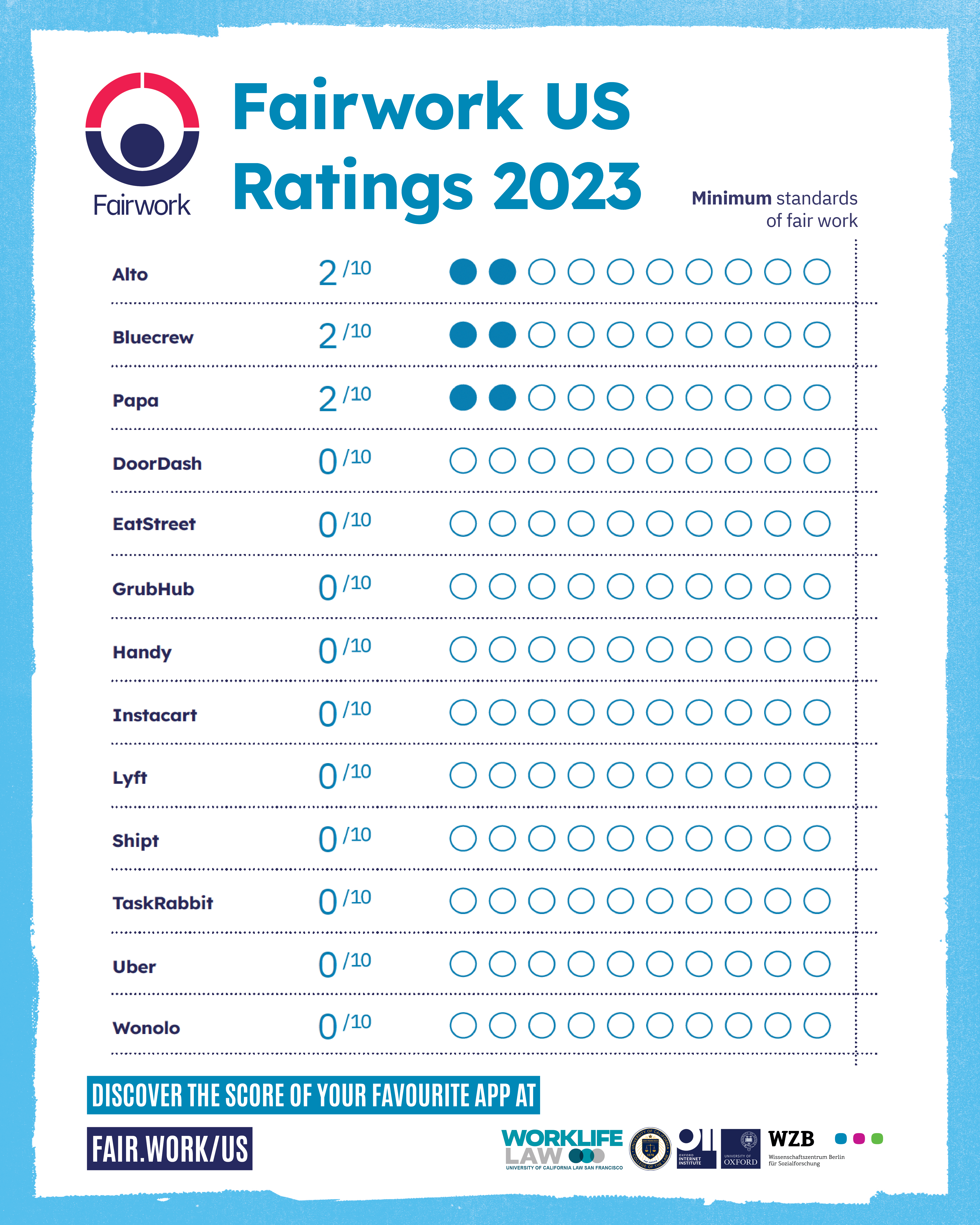Fairwork US finds that workers of colour disproportionately bear the brunt of risks associated with gig work

New report from Fairwork US–based at the University of California College of Law, San Francisco and Oxford University–reveals that none of the major gig companies examined in the United States (US) are guaranteeing adequate working conditions and that workers of colour disproportionately bear the brunt of the risks associated with gig work.
Millions of people in the US work in the gig economy, but the new report on gig workers confirms many of these workers face low pay and dangerous conditions. This is the first study of its kind in the US scoring companies across multiple sectors on labour standards such as pay, conditions, contracts, management, and representation.
The report, “Fairwork US Ratings 2023: A Crisis of Safety and Fair Work in a Racialised Platform Economy“, scores platforms on to how fairly they treat workers across five sectors (ride-hailing, delivery, domestic work, elderly care, and warehousing) in six different US states, and examines companies hiring their workers both as independent contractors and as employees. Only three platforms—Alto, Bluecrew, and Papa—scored 2 points out of 10. Two of these companies (Alto and Bluecrew) hire their workers as employees. While these scores are still low, these companies are providing better working conditions than the 10 other major platforms examined including Uber, Instacart, and Lyft who could not evidence meeting any minimum standards of decent work—such as ensuring all workers earn above the local minimum wage.
Ratings

Key Findings
Fair Pay: Only 2 of the 13 platforms (Alto and Bluecrew) can ensure their workers earn the minimum wage after costs.
Fair Conditions: 3 out of the 13 platforms (Alto, Bluecrew, and Papa) provided evidence that they offer sufficient protection to workers from task-related risks.
Fair Contracts: 1 out of the 13 platforms analysed (Papa) provided evidence of clear and accessible contracts or terms of service.
Fair Management: None of the 13 platforms could evidence they have a formalised process where workers can appeal disciplinary decisions like deactivations from the platform.
Fair Representation: None of the 13 platforms could evidence that they meet the criteria for collective representation of workers.
Publishing this study, researchers from Fairwork US are calling for stronger protections and more robust enforcement of labour law in the US platform economy.
Professor Veena Dubal, Principal Investigator on the project said: “We found that workers hired by platform firms as employees maintained autonomy and flexibility associated with gig work and enjoyed much better working conditions. But we need strong labour law enforcement to encourage these models and to facilitate a market in which these companies can actually compete.”
Lead Researcher of the report, Postdoctoral Fellow Dr. Mishal Khan said: “Low standards of work in the platform economy is a racial justice issue. Most workers across sectors are Black and workers of colour. The challenges they face on the job – such as harassment in high income neighborhoods, verbal abuse, and threats of violence – are rooted in racial discrimination. This report is a first step in shedding light on some of the systematic issues that workers are facing across the country.”
Nicole Moore, Part-time Lyft Driver and President of Rideshare Drivers United (RDU) said: “This report brings the crisis of gig work in clear focus. It is high time for our elected officials and regulators to stop allowing companies to hide behind the “gig” label to underpay workers and avoid paying into the safety net that we need to survive.”
Professor Mark Graham, Professor of Internet Geography at Oxford Internet Institute and Director of Fairwork, said: “The fact that so few companies can evidence that they guarantee minimum standards of fair work for their workers is a shocking indictment into the state of the gig economy. The Fairwork scores show that decent work is possible. But they also show that, without more effective regulation, few digital platforms are willing to step up and provide fair conditions for their workers.”
What can I do? Fairwork Pledge
As part of Fairwork’s commitment to making platforms accountable for their labour practices, we have launched the Fairwork Pledge. This pledge aims to encourage other organisations to support decent labour practices in the platform economy, guided by the five principles of fair work.
Organisations like universities, schools, businesses, investors and charities that make use of platform labour can make a difference by supporting platforms that offer better working conditions. Organisations have the option to sign up to the Pledge as an official Fairwork Supporter or an official Fairwork Partner. Those signing up to be a Supporter must demonstrate their support for fairer platform work publicly and provide their staff with appropriate resources to make informed decisions about what platforms to use. Becoming a Fairwork Partner entails making a public commitment to implement changes in their own internal practices, such as committing to using better-rated platforms when there is a choice.
More than 40 organizations, including GIZ, Solidarity Center, Learning Lions, WZB Berlin Social Science Center, and FES, have already signed the pledge. Join them in demanding a fairer future of work!